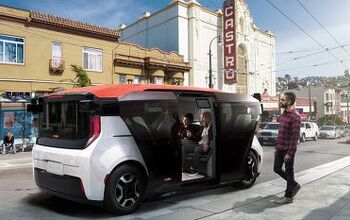Fired Audi Engine Developer Kept Secret Document That Could Sink CEO

There’s no end to the layers of intrigue swirling around the upper echelons of Audi.
Last week saw four engineers who worked on the company’s emissions-rigged diesel engines fired, with one of them, former engine development chief Ulrich Weiss, claiming in court that CEO Rupert Stadler was privy to the deception.
Audi fired back with a lawsuit threat against one or more individuals for “baseless accusations” and the revealing of internal documents. Now, the German publication Bild has released information on a potentially damning document that was reportedly locked away in Weiss’s safe since 2015 for exactly this purpose.
Weiss pulled out the document in a German labor court Tuesday to prove he’s the “pawn” his lawyer claims.
According to Bild, the document, dated July 28, 2015 — two months before the diesel emissions scandal broke wide open in the U.S. — could prove that Weiss was simply doing the the bidding of upper management.
In the summer of 2015, Audi’s plan to launch its Q7 SUV in Hong Kong hit a snag. Emissions from the vehicle’s 3.0-liter V6 were far greater than the jurisdiction would allow. (An internal report showing this was also shown in court.) Weiss claims he was ordered by his superiors to approve the use of defeat devices on Hong Kong-bound vehicles in order to side-step environmental regulations.
The document Weiss presented in court is a letter allegedly composed by his superiors, ordering him to cheat. The engineer demanded the order in writing as a way of safeguarding himself.
On that letter is the signature of powertrain development head Thomas Heiduk, who allegedly sought — and gained — approval from CEO Rupert Stadler, former technical development rep Ulrich Hackenberg, quality assurance head Werner Zimmermann and product management boss Michael Neumayer. The note reads that all four board members agreed to the procedure.
Weiss’ lawyer claims that his client placed the letter in his safe, telling his employees, “We will not do it anyway. We’re sitting out.”
Audi placed Weiss on leave in November, 2015, where he remained until last week’s firing. The automaker accuses him of destroying documents as part of the emissions cover-up, as well as keeping executive board members in the dark about the brewing scandal.
[Image: Audi]

More by Steph Willems
Latest Car Reviews
Read moreLatest Product Reviews
Read moreRecent Comments
- W Conrad I'm not afraid of them, but they aren't needed for everyone or everywhere. Long haul and highway driving sure, but in the city, nope.
- Jalop1991 In a manner similar to PHEV being the correct answer, I declare RPVs to be the correct answer here.We're doing it with certain aircraft; why not with cars on the ground, using hardware and tools like Telsa's "FSD" or GM's "SuperCruise" as the base?Take the local Uber driver out of the car, and put him in a professional centralized environment from where he drives me around. The system and the individual car can have awareness as well as gates, but he's responsible for the driving.Put the tech into my car, and let me buy it as needed. I need someone else to drive me home; hit the button and voila, I've hired a driver for the moment. I don't want to drive 11 hours to my vacation spot; hire the remote pilot for that. When I get there, I have my car and he's still at his normal location, piloting cars for other people.The system would allow for driver rest period, like what's required for truckers, so I might end up with multiple people driving me to the coast. I don't care. And they don't have to be physically with me, therefore they can be way cheaper.Charge taxi-type per-mile rates. For long drives, offer per-trip rates. Offer subscriptions, including miles/hours. Whatever.(And for grins, dress the remote pilots all as Johnnie.)Start this out with big rigs. Take the trucker away from the long haul driving, and let him be there for emergencies and the short haul parts of the trip.And in a manner similar to PHEVs being discredited, I fully expect to be razzed for this brilliant idea (not unlike how Alan Kay wasn't recognized until many many years later for his Dynabook vision).
- B-BodyBuick84 Not afraid of AV's as I highly doubt they will ever be %100 viable for our roads. Stop-and-go downtown city or rush hour highway traffic? I can see that, but otherwise there's simply too many variables. Bad weather conditions, faded road lines or markings, reflective surfaces with glare, etc. There's also the issue of cultural norms. About a decade ago there was actually an online test called 'The Morality Machine' one could do online where you were in control of an AV and choose what action to take when a crash was inevitable. I think something like 2.5 million people across the world participated? For example, do you hit and most likely kill the elderly couple strolling across the crosswalk or crash the vehicle into a cement barrier and almost certainly cause the death of the vehicle occupants? What if it's a parent and child? In N. America 98% of people choose to hit the elderly couple and save themselves while in Asia, the exact opposite happened where 98% choose to hit the parent and child. Why? Cultural differences. Asia puts a lot of emphasis on respecting their elderly while N. America has a culture of 'save/ protect the children'. Are these AV's going to respect that culture? Is a VW Jetta or Buick Envision AV going to have different programming depending on whether it's sold in Canada or Taiwan? how's that going to effect legislation and legal battles when a crash inevitibly does happen? These are the true barriers to mass AV adoption, and in the 10 years since that test came out, there has been zero answers or progress on this matter. So no, I'm not afraid of AV's simply because with the exception of a few specific situations, most avenues are going to prove to be a dead-end for automakers.
- Mike Bradley Autonomous cars were developed in Silicon Valley. For new products there, the standard business plan is to put a barely-functioning product on the market right away and wait for the early-adopter customers to find the flaws. That's exactly what's happened. Detroit's plan is pretty much the opposite, but Detroit isn't developing this product. That's why dealers, for instance, haven't been trained in the cars.
- Dartman https://apnews.com/article/artificial-intelligence-fighter-jets-air-force-6a1100c96a73ca9b7f41cbd6a2753fdaAutonomous/Ai is here now. The question is implementation and acceptance.


































Comments
Join the conversation
Hint to would-be law-breaking Corporate Executives: When an underling asks you to say, in writing: "I would like you, lowly peon, to violate the law", this is not so the underling has a fond memento of your impressive leadership prowess. What on earth was Audi thinking when they thought accusing him of "releasing internal documents" would be a clever litigation strategy. OF COURSE it was going to end up with the release of some additional documents to the general public! Ones GUARANTEED to be embarrassing! Maybe he did, in fact, ALSO destroy documents that would incriminate him, but it was foolish, in the extreme, to assume he would not have some a$$-covering stashed away under the proverbial mattress. Though they also managed to botch the "hush money" strategy with that compliance lead, so perhaps they are just inept at every level when it comes to corporate malfeasance.
As a fellow engineer, I can only attest to this... the first thing that they never teach you in university is to get every friggin' detail down on paper, and don't lift a finger unless a superior signed it.